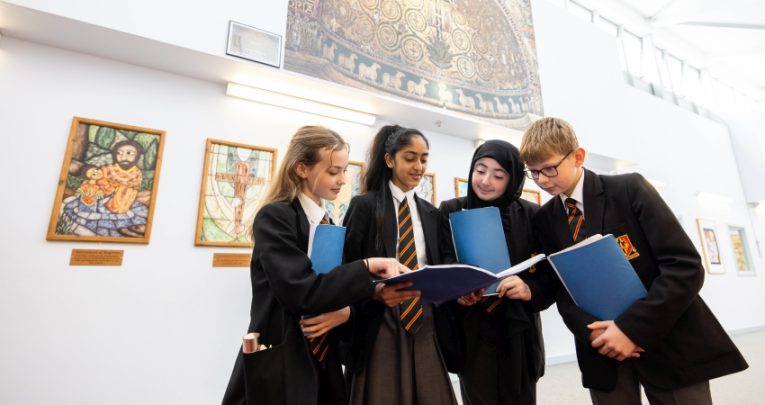School improvement – “We established a new hierarchy of sanctions”

Principal Dominic McKenna unpacks the thinking behind St Margaret Ward Catholic Academy’s ongoing school improvement journey

As a school, one of our key values includes concern for the poor and social justice.
We have a number of students from low income family backgrounds, who have difficulties and challenges to overcome that are far greater than those faced by their peers in other parts of the country, yet there’s only so much we can control. One thing we can do, however, is make sure they receive the best possible results they can while they’re here with us.
Back in March of 2019, we came to recognise as a staff that there were a series of issues throughout the school that we weren’t happy with, and conceded that we needed to come together and make a change.
Our first step was to set up a voluntary meeting for all staff, where colleagues could gather together and come up with some ideas about where we wanted to be, what we should to do, and what we wanted the experience of learning at St Margaret Ward to look like.
In the event, everybody ended up staying well into the evening, sitting as groups with large sheets of paper and pens and making lists of everything they wanted us to put into practice. It turned out that there was a surprisingly large degree of consistency in what came back, even between the ambitions of teachers and SLT.
At around the same time, I went with my deputies to visit several other schools around the country, including settings in Birmingham and Great Yarmouth, and bring some external influence to bear on what we were doing. We then sat down as an SLT every Thursday for a term, and proceeded to map out our school improvement plan and the processes we would implement in time for the following September.
The St. Margaret Ward Way
What emerged out of this process is what we call The St. Margaret Ward Way – a clear system of processes, supported by our moral purpose, which were shared across the school. Starting in the latter part of 2019, we established a new hierarchy of sanctions and rewards for behaviour, and established consistent messaging to try and change the culture of the school and ensure buy-in to a different set of expectations.
That involved adopting practices like centralised detentions at the end of each day, specific support and integration for students facing particular challenges and ensuring everybody is able to concentrate on working in every lesson without disruption.
Since then, we’ve put in place a challenging academic curriculum, maintaining a strong emphasis on behaviour, and seen to it that students arrive at school each day knowing that they’re here to be successful. I’d say we’ve been largely successful in doing that over the last few years, and have certainly seen a positive change in the culture and attitudes shown by students.
Controlled routines
What we wanted to achieve with the St. Margaret Ward Way was a means of imposing set methods and approaches across the school that were consistent and fully-thought through, backed up by consistent planning and implemented in such a way that everybody understood what was required of them.
One of our main concerns throughout the COVID pandemic was a sense of having things imposed upon us, often at quite short notice, which required a great deal of planning. That inevitably took away some of our autonomy, which we were initially resentful of, but there were certain steps taken during that period that I believe actually enhanced what we were trying to do.
These included the measures we put in place to ensure that strictly controlled routines and behaviours were observed by all students upon morning arrival. All students reported to specific zones depending on their year group, and then lined up in alphabetical order, in silence. We would then deliver the messages for the day, after which everybody applied hand sanitiser before entering the building and heading to their base for the day.
Because of how regimented everything had to become with those COVID measures, I think it actually helped us in long-run, which is why we chose to keep some of those practices, including the line-ups. Students still gather with friends in specific areas when they arrive each morning, and when the whistle is blown, they will go silent and move into their lines. There will then be a prayer and a couple of messages to start the day, before they’re led to their form rooms.
Transforming lives
Another important aspect of our change programme concerns the revising of our curriculum, which was inspired by a phrase attributed to St Jean Baptist de la Salle – “Teaching minds, touching hearts and transforming lives.”
We’ve split our school curriculum into two parts: ‘Teaching Minds’ and ‘Touching Hearts’. The former refers to our academic curriculum, which we’ve worked to carefully sequence and rigorously structure. The latter covers everything else – from the formation of the child, to our PSHE, careers support and what’s needed for us to foster students’ development.
Something we notice now is that when we receive visitors, they’re often interested in how calm the school is, the politeness demonstrated by our students, and how friendly and happy they seem to be.
It’s not perfect, of course. We still have our moments, like every other school, and continue to work carefully with some challenging students and families – but the vast majority of students are delightful.
We remain on a long-term school improvement journey and are focused on where we want to go, but it’s also important for us to identify any areas of deficiency. Literacy has recently emerged as one area we intend to work on more.
More broadly, however, the main challenges we face at the moment largely stem from uncertainties. We’ve observed the impact that the cost of living crisis is having on some families, as well as the effect it’s having on our suppliers and our costs as a school.
The situation with school funding is now perhaps not quite as bleak as we thought it might be, but we still have some concerns over what the future will look like. It’s those things out of our control that currently concern us the most.
Dominic McKenna is the principal at St Margaret Ward Catholic Academy
Time to reflect
Jen Eardley, pastoral lead for KS3, describes the school’s unique take on form time
Myself and another colleague developed Signum Fidei (from the Latin for ‘sign of faith’) as a replacement for the traditional form time found at other schools. This is a 30-minute period every morning used as time for pastoral care in the truest sense, in that we give students spiritual and personal guidance.
Students start each day with with prayer, and then work on various activities. They might look at a Gospel or saint of the week and complete some activities based around that, hold a weekly discussion on a topic relating to events in the local area or the wider world, or look at ways of raising money for local charities and causes. Students also receive one-to-one mentoring conversations with their Fidei tutor on a rotating basis each week.












